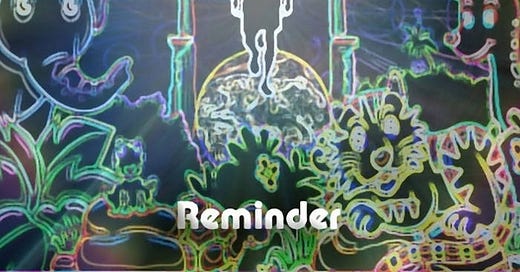THE GENRE PROJECT - January 11 - Hi-Tech Psytrance
Genre of the Day - Hi-Tech Psytrance
Album of the Day - Reminder by Junxpunx (2014)
Today’s genre is a smorgasbord of words. The feeling of reading this title is almost akin to seeing a sentence in a different language you’re learning where you know all the words’ meanings separately, but together you’re at a loss. Inversely, though, seeing today’s album cover also immediately cemented a notion of what this album would sound like. It’s aggressively 2014, Burning Man proponent, 27-year-old discovering empathy for the first time via ayahuasca trip. I guess Burning Man is maybe not trance; but therein lies this column’s purpose, to expand my musical horizons.
This is a pretty niche subfield within psytrance, which is generally defined as trance music characterized by psychedelic rhythms with layered, high-tempo riffs. The genre has more of an interesting history than I perhaps would’ve expected, with its origins being in Goa—essentially the Bali of India, for those unfamiliar—music festivals bridging EBM with the psychedelic rock of the 70s that had long been the mainstay of the hippie European visitors to the genre. The affix hi-tech indicates a deeper interest in futuristic, strange lines of sound and an even faster tempo.
This is a fusion music drawing from a wide range of stylistically separate influences, and the music certainly delivers. It is also a subgenre that lies on the extreme point of the spectrum all overarching genres can be expected to have, rather like our previous friends serialism and Frenchcore. I liked today’s album (#2 on RYM; the #1 isn’t on Spotify and who has time for that) much more than I expected to, mostly because it’s just so sonically dynamic; these songs are long and indulgent (occasionally to a grating extent such as the incessantly repeated ‘now’ that really sounds like ‘meow’ on late-stage track Goolaxy) but at their best every single minute Junxpunx masterfully weaves in a new ensnaring riff or freaked-out drum pattern such as on the loungey rapture of Reexist. He also uses rap samples at points on the album, which I don’t know how to feel about because for the most part the frenzied BPMs of the music actively work against the raps’ flows and is a bit of a misstep. However, overall this is an album I do think I could actually recommend to someone interested in this area of music; when put side by side with Micropoint’s Neurophonie, the most adjacent album I’ve heard in this project so far, I think psytrance’s emphasis on melodiousness and drum patterns that compliment the riffs more than define the music wholly is perhaps a little more accessible and trance-scendent. Okay, column over.




